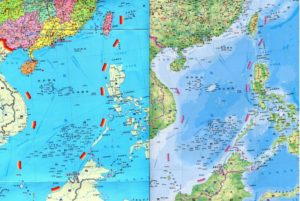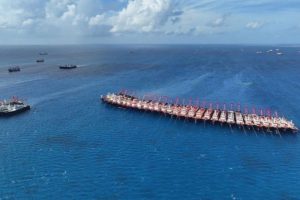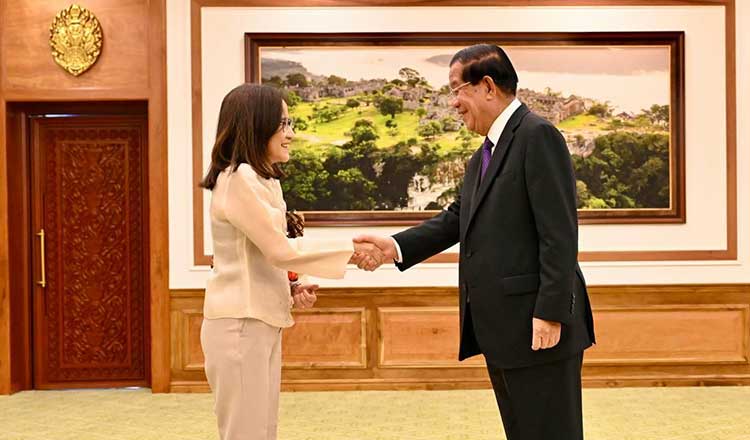ASEAN HEADLINE-ASIA GEOPOLITICS | PHNOM PENH: Hun Sen urges South China Sea dispute nations to adhere to DOC

Senate President Hun Sen yesterday asked all parties involved in the South China Sea dispute to respect and adhere to the Declaration on the Conduct of Parties in the South China Sea (DOC) in order to ease tensions and find a solution.
“Cambodia welcome the talks that the Philippines is holding with China as well as other relevant countries, including Vietnam, to ease tensions and find a specific solution in easing the situation in the South China Sea,” he said.
“All parties in the South China Sea should adhere to the DOC signed in Phnom Penh in 2002. We urge all parties to mediate to avoid any conflicts and to have constructive discussions to avoid regional tensions,” he said. “We promote the role of the Association of Southeast Asian Nations (ASEAN) and the countries concerned in negotiating to achieve the Code of Conduct (COC) as soon as possible.”
The remarks came in response to a visit by Philippines Ambassador Flerida Ann Camille P. Mayo to the Senate as a courtesy call. The Philippines and China have been the two nations most at odds with each other recently over the issue of ownership of certain portions of the South China Sea that both claim.
Mr Hun Sen said that if the COC is achieved it will reduce tensions and countries in the region will have mutual trust and the South China Sea could become an important channel for cross-border trade in the region as well as internationally.
Mr Hun Sen and Ambassador Mayo also exchanged views on international issues, including the conflict in Myanmar as well as the aforementioned South China Sea controversy.
China anchored one of its two “monster” coast guard ships inside the Philippines’ exclusive economic zone (EEZ) last week in what a Philippine official called an act of “intimidation” in the ongoing territorial dispute between Beijing and Manila in the South China Sea.
Philippine Coast Guard spokesperson Jay Tarriela was quoted by CNN yesterday as saying that the Chinese Coast Guard vessel CCG-5901 anchored near Sabina Shoal in the Spratly Islands about 80 miles (130 kilometers) northwest of the Philippines island of Palawan on July 3, well within Manila’s 230-mile EEZ.
![]()
 ….
….
Displacing 12,000 tons and with a length of 541 feet, CCG-5901 is three times the size of the United States Coast Guard’s main patrol vessels, the National Security Cutters – leading many observers to refer to the Chinese vessel as “The Monster.”
While at Sabina Shoal, the Chinese ship anchored within 800 yards of one of the Philippines Coast Guard’s newest and biggest ships previously deployed to the area, Tarriela said in a post on X.
On June 14, the Philippines is seeking UN validation to extend its continental shelf in the South China Sea and secure exclusive rights to exploit undersea resources.
The Department of Foreign Affairs of the Republic of the Philippines released a statement that said that the Philippines has submitted information to the UN Commission on the Limits of the Continental Shelf (CLCS) to register the country’s entitlement to an extended continental shelf (ECS) in the West Palawan Region in the West Philippines Sea or South China Sea.
Under Article 76 of the UN Convention on the Law of the Sea (UNCLOS), a coastal state such as the Philippines is entitled to establish the outer limits of its continental shelf comprising the seabed and subsoil of the submarine areas extending beyond 200 nautical miles (NM) but not to exceed 350 NM from the baselines from which the breadth of the territorial sea is measured, it said.
 ….
….
China’s Foreign Ministry Spokesperson Mao Ning said in a press conference on May 29 that its regulations are used by China’s Coast Guard to standardise the administrative law-enforcement procedures of Coast Guard agencies and better uphold order at sea.
“It is consistent with universal practices. Individuals and entities have no need for concern as long as they have not done anything illicit,” she said. “Let me stress that it is the Philippines, not China, that has escalated the situation and made repeated provocations in the South China Sea.”
“China’s door of dialogue and communication with the Philippines remains open, but it’s important to note that dialogue requires sincerity and whatever is agreed to in dialogue must be acted upon, rather than talking about the need for dialogue while continuing to make provocations,” Mao added.


 Memento Maxima Digital Marketing
Memento Maxima Digital Marketing







